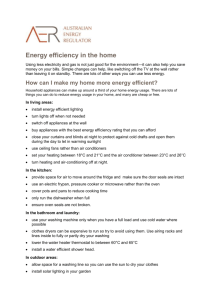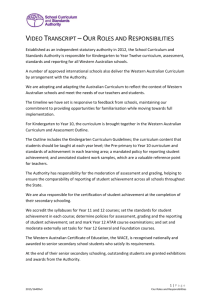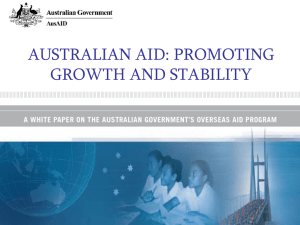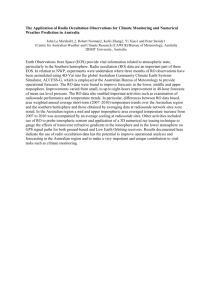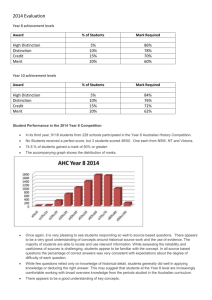Energy efficiency in the home - Australian Competition and
advertisement
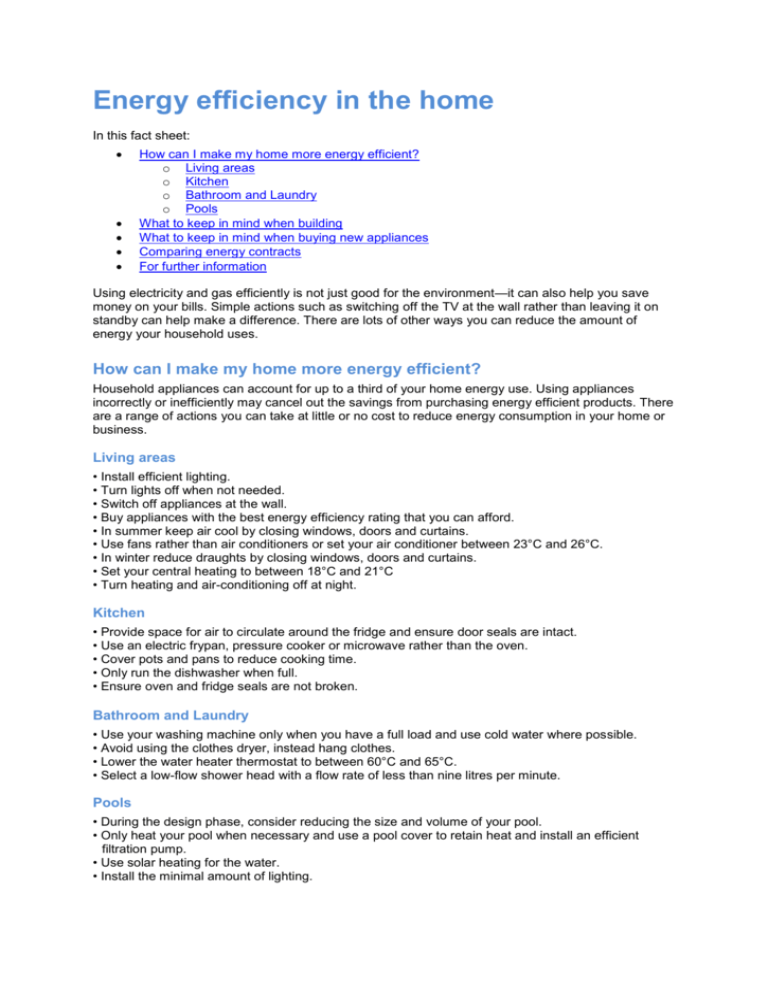
Energy efficiency in the home In this fact sheet: How can I make my home more energy efficient? o Living areas o Kitchen o Bathroom and Laundry o Pools What to keep in mind when building What to keep in mind when buying new appliances Comparing energy contracts For further information Using electricity and gas efficiently is not just good for the environment—it can also help you save money on your bills. Simple actions such as switching off the TV at the wall rather than leaving it on standby can help make a difference. There are lots of other ways you can reduce the amount of energy your household uses. How can I make my home more energy efficient? Household appliances can account for up to a third of your home energy use. Using appliances incorrectly or inefficiently may cancel out the savings from purchasing energy efficient products. There are a range of actions you can take at little or no cost to reduce energy consumption in your home or business. Living areas • Install efficient lighting. • Turn lights off when not needed. • Switch off appliances at the wall. • Buy appliances with the best energy efficiency rating that you can afford. • In summer keep air cool by closing windows, doors and curtains. • Use fans rather than air conditioners or set your air conditioner between 23°C and 26°C. • In winter reduce draughts by closing windows, doors and curtains. • Set your central heating to between 18°C and 21°C • Turn heating and air-conditioning off at night. Kitchen • Provide space for air to circulate around the fridge and ensure door seals are intact. • Use an electric frypan, pressure cooker or microwave rather than the oven. • Cover pots and pans to reduce cooking time. • Only run the dishwasher when full. • Ensure oven and fridge seals are not broken. Bathroom and Laundry • Use your washing machine only when you have a full load and use cold water where possible. • Avoid using the clothes dryer, instead hang clothes. • Lower the water heater thermostat to between 60°C and 65°C. • Select a low-flow shower head with a flow rate of less than nine litres per minute. Pools • During the design phase, consider reducing the size and volume of your pool. • Only heat your pool when necessary and use a pool cover to retain heat and install an efficient filtration pump. • Use solar heating for the water. • Install the minimal amount of lighting. What to keep in mind when building When building or renovating, try to incorporate energy efficient design principles. • Insulate ceilings and walls to retain warm air in winter and cool air in summer. • Install ceiling fans. • Install solar panels and a solar hot water system. • If you have a gas connection, install a gas oven or cooktop. Quick tip Grants and rebates may be available to you for energy saving equipment that you install in your home. Visit the Australian Government’s Living Greener website (www.livinggreener.gov.au) for details about grants and rebates available in your state or territory. What to keep in mind when buying new appliances New appliances, especially for heating and cooling your home, can be expensive. It is therefore important to take some time to choose the right appliance for your needs. Often appliances with a higher energy efficiency rating will cost more to purchase than those with lower efficiency ratings, but over their lifetime a more efficient appliance could end up costing you less overall to run. For further information about choosing energy efficient appliances, see the Australian Government’s Energy Rating website (www.energyrating.gov.au). Comparing energy contracts Another way to save money on your energy is to shop around and compare energy contracts. As well as varying in price and duration, energy contracts may have different payment options, fees and can include other incentives such as movie tickets and magazine subscriptions. If you are thinking of switching contracts it is important that you take some time to compare the different offers available to you. You should consider all the elements of the offer, including the price, to make sure it is suitable. Quick tip A good way to compare energy contracts is to use a price comparison website. Energy Made Easy (www.energymadeeasy.gov.au) is an independent government website operated by the AER which was launched on 1 July 2012. Energy Made Easy also provides tips on energy efficiency. For further information This publication can be downloaded from the Australian Energy Regulator (AER) website: www.aer.gov.au Australian Energy Regulator Infoline 1300 585 165 Energy Made Easy Visit Energy Made Easy to understand and make more informed choices about energy www.energymadeeasy.gov.au Other contacts Indigenous Infoline: 1300 303 143 For information in languages other than English call 13 1450 and ask for 1300 585 165 TTY users phone 13 3677 and ask for 1300 585 165 Internet relay users connect to the NRS (see www.relayservice.com.au) and ask for 1300 585 165 State and Australian government departments The state, territory and Australian government departments listed below include energy saving tips, information about electricity and gas grants and rebates available to you, solar electricity and other energy saving initiatives. Queensland Queensland Department of Employment, Economic Development and Innovation www.deedi.qld.gov.au New South Wales Trade & Investment, Regional Infrastructure & Services www.industry.nsw.gov.au Australian Capital Territory ACT Department of Environment, Climate Change, Energy and Water www.environment.act.gov.au Victoria Victorian Department of Primary Industries www.dpi.vic.gov.au South Australia Government of South Australia www.sa.gov.au/energy Tasmania Tasmanian Office of Energy Planning and Conservation www.dier.tas.gov.au/energy/home Australian Government Department of Climate Change and Energy Efficiency www.climatechange.gov.au For more detailed information on efficient appliance use and home design tips, see the Australian Government’s technical guide for home energy use, available at www.yourhome.gov.au/technical Australian Competition and Consumer Commission 23 Marcus Clarke Street, Canberra, Australian Capital Territory 2601 ©Commonwealth of Australia 2012 Important notice The information in this publication is for general guidance only. It does not constitute legal advice or other professional advice, and should not be relied on as a statement of the law in any jurisdiction. Because it is intended only as a general guide, it may contain generalisations. You should obtain professional advice if you have any specific concern. The ACCC has made every reasonable effort to provide current and accurate information, but it does not make any guarantees regarding the accuracy, currency or completeness of that information. ISBN 978 1 921973 17 8 ACCC 07/12_47972_584
